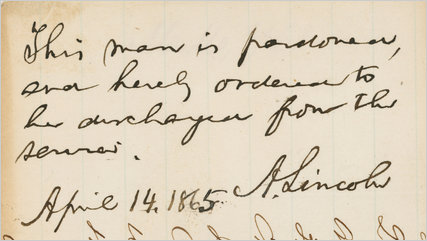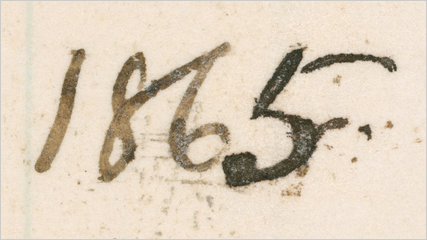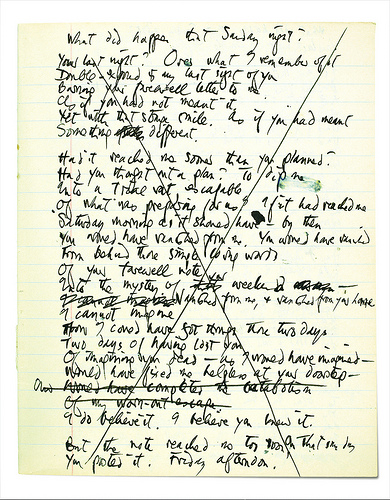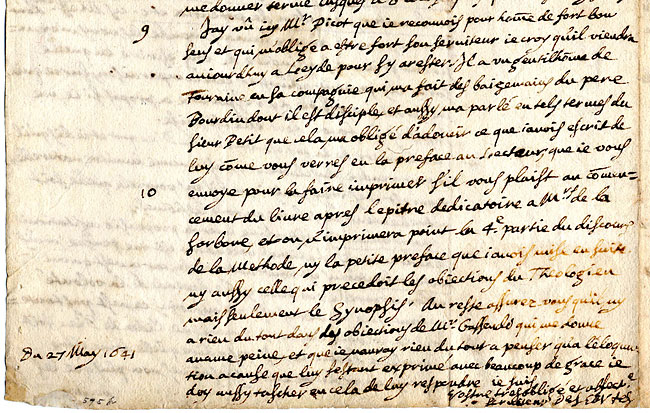
The Digital Document Assignment: Why it matters (& why it can be fun!)
I've been using the Digital Document Assignment for several semesters now, and I always get excited to see the new documents that students discover in their research for this project. I'm also continually amazed at the ways that archives -- digital and otherwise -- end up making news. Here are a few recent news articles that connect with issues of archives, documentation, authenticity, and interpretation, that I think help show how studying archives (the way we do with this project) is incredibly interesting and important.
Exhibit 1: Documents get Altered
One of the things I ask students to do is to look closely at the documents. Is there evidence of alteration? Who might have changed the document, and when...and why? A recent opinion piece in the New York Times ("A Blot on Lincoln Historians" by Harold Holzer, January 26, 2011, linked here as a PDF) explains that a famous Lincoln document -- a pardon of a soldier that he supposedly signed hours before his own assassination -- was actually a forgery. Lincoln did in fact pardon the man (Private Patrick Murphy) but on April 14th, 1864, one year prior to his death. Someone changed one number in the date -- making a "4" into a "5" -- and scholars are pointing to the historian who first brought the document into the public eye. Definitely take a look at the article -- it's quite interesting! I've pasted below the two images; the bottom one shows a close-up of the altered date in question.


Exhibit 2: There are always documents waiting to be found (or re-found!):
Last fall, a scholar working in the British Library found a previously unknown poem by Ted Hughes, husband of Sylvia Plath. The poem, written shortly after Plath's suicide, reveals his struggle with facing her death. Here's a link to a story about it in The Guardian, and here's a link to the story on NPR. You can read the full text of the poem and see the multiple handwritten drafts at The New Statesman here.

This is the first draft in Hughes' hand -- image taken from http://www.newstatesman.com/blogs/cultural-capital/2010/10/hughes-poem-poet-publish
Exhibit 3: Intrigue!
While documents themselves can be fascinating, often times their backstories -- what happened to them -- make for amazing stories, too! In the 1840s, an Italiam mathematician, Count Guglielmo Libri, stole 72 of the letters of Rene Descartes (he of "I think therefore I am" fame) from various public libraries in France. In February of 2010, the New York Times reported that one of the letters (written by Descartes in 1641) had been found in an archive at Haverford College in Pennsylvania, where it was once the subject of an undergraduate student's research paper. The letter has since been returned to France, and scholars have used it to gain further understanding of Descartes' revisions to his ideas.

Above image from the New York Times article here: http://www.nytimes.com/2010/02/25/books/25descartes.html
The above are just a few recent articles that caught my attention. If you know of other interesting cases of archival or library sleuthing, please share them with me.
A good digitial document project doesn't have to make some big huge discovery that changes history (though that would obviously be very cool!). Instead, I urge you to find a document that is interesting to you. Perhaps it connects with an activity you enjoy (I've had projects on athletics, music, and dancing), or shows the drafting of another document that we've read for class (I've had great projects on drafts of poems by Emily Dickinson, Emerson, and Whitman). Many students have enjoyed looking at advertisements, children's literature, and other areas of popular culture. You might also think of a local connection; the Center for Lowell History has great documents about Lowell, but if you're from another town (or have lived elsewhere for some period of your life) it's very possible that there are interesting documents related to that place. You could look up an ancestor, or try to find someone from the past with the same name as you. You can dig up someone's private letters or journal. There are many ways for you to find a document that interests you, and that will make your paper much more interesting -- for you to write, for the class to hear about, and for me to read! If you're looking for suggestions, please talk to me!